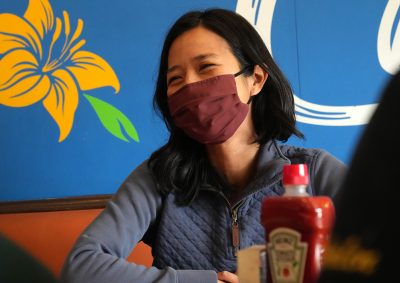
Boston Public School’s mask mandate will remain in effect beyond the state’s end-of-month deadline, Mayor Michelle Wu announced at a Feb. 10 press conference.
Wu’s decision came one day after Department of Elementary and Secondary Education Commissioner Jeffrey Riley announced that Massachusetts will lift its mask mandate for K-12 schools on Feb. 28.
“I don’t presume to know what should or could have gone into the governor’s calculation,” Wu said. “What I know is that the city of Boston is not ready to lift our mask mandate, and so ours will stay in place for the time being.”
Speaking on the issue, Governor Charlie Baker said DESE issued alternative guidance for a mask mandate in “specific scenarios” — such as on school buses, in public schools, and in instances where the community chooses to prolong the mandate.
Baker said the state is implementing other preventive measures in place of the mandate.
“We’re running vaccine clinics in schools across the state,” Baker said at a Feb. 9 press conference. “We established the country’s first free K-12 surveillance testing program, and recently launched the take-home test program, which is available to every educator and child in Massachusetts.”
Sarah Horsley, co-founder of BPS Families for COVID Safety — a group advocating for COVID safety measures in BPS — said the state’s decision takes into consideration the mental well-being of students.
“There is a concern about students’ mental health and wanting for young people, for children to have more of a sense of normalcy,” Horsley said. “And I can understand that, but it’s like, we’re not there yet.”
Wu said since BPS has experienced larger gaps in vaccination rates, the City’s Public Health Commission is waiting for “a consistent trend of downward progress” in COVID-19 cases before considering lifting the mask mandate.
“The poorest Massachusetts communities, many of whom have been really hard hit by COVID in general, have the lowest vaccination rates, 30% or lower,” Horsley said. “In not only Boston, New Bedford, Springfield, but also 112 communities total.”
Horsley said the state can support increasing children’s vaccination rate.
“Everybody is trying to work together to really get the vaccination rates up, to do a lot of education and outreach to families that maybe are reluctant to get their students vaccinated,” she said.
Medical director of the Blake 12 Intensive Care Unit and an emergency physician at Mass General Hospital, Jarone Lee, said the state’s decision indicates where Massachusetts stands on COVID-19 transmission rates.
“I think that it is a good sign that we’re at a point where we can start thinking about this,” Lee said. “However, I’ll say also that a lot of this is also local, right? Each county, each part of Massachusetts, is different.”
Lee echoed Wu’s statements saying Boston’s rate of transmission and hospitalizations are still high.
“I do really think that the metrics that have been set by the mayor’s office work well, knowing that we’re almost there, but we’re not quite there yet,” Lee said.
The CDC still recommends universal indoor masking, especially in communities where indoor ventilation is substandard. Horsley added some schools have inadequate heating, ventilation and air conditioning systems to combat the spread of the disease.
“In Boston, three-quarters of the schools don’t have mechanical ventilation, so they don’t have HVAC systems,” Horsley said. “A lot of schools where ventilation is not as good, and there’s households that have vulnerable members in them … then you’ve got to have that mask requirement to help.”
When considering lifting the mandate, Lee said it’s not just students who need to be concerned.
“I personally do worry that if we remove the mask mandates in schools too early, we’re going to have another resurgence,” Lee said. “And remember, it’s not even just protecting our kids, it’s also protecting everyone associated with our kids.”






























































































































S Squeglia • Feb 17, 2022 at 8:57 am
Mayor Wu, what happened to “follow the science”? Mayor Wu follows the teacher’s union. Votes are more important than children.